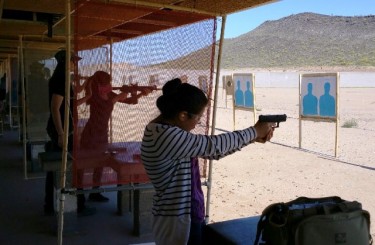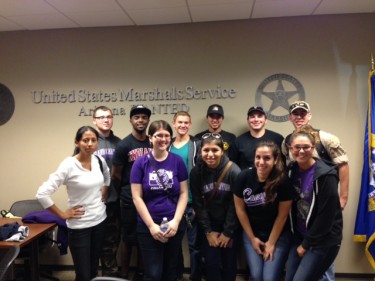By Michael Ferraresi
GCU News Bureau
Jobs in criminal justice are seldom as they appear on TV. Law enforcement officers rarely spend their shifts kicking down doors or wrestling with suspects, and there’s far more paperwork required than is depicted in run-and-gun Hollywood action films.
Grand Canyon University justice studies students get that reality check in class before they will hit the streets in their crime-fighting careers. This year, as part of their courses and through the Lopes Justice Society club, undergraduates were taken on dozens of field-experience trips to police departments and other agencies for a glimpse at life behind the badge.
Students traveled to the Arizona state prison complex at Florence and did ride-alongs with cops in high-crime areas in Los Angeles, Las Vegas and other major cities. Lopes Justice Society also has hosted dozens of guest speakers on campus, including agents with the U.S. Drug Enforcement Administration and FBI and municipal agencies such as the Phoenix Police Department. Most of them provided information about recruitment standards and potential job openings.
Faculty say such real-world exposures are essential in helping students refine their career interests and network in the industry.
“It allows students to really open their eyes and think about their future careers,” said Kassie Flores, the sophomore president of Lopes Justice Society.
“I still get excited when we have a guest speaker visit, but I’ve known what I’ve wanted to do since I was 15,” said Flores, who wants to work as a sheriff’s deputy in the Seattle area.
She joined her peers Saturday at a firearms training at Ben Avery Shooting Facility in north Phoenix with members of the U.S. Marshals Service. The trip was led by professor Cornel Stemley, a former police detective who has taught at GCU since 2010.
During a recent trip to San Diego, Stemley organized ride-alongs with the San Diego Police Department and the regional branch of the U.S. Border Patrol, which polices the line between California and Tijuana, Mexico.
In Los Angeles, students shadowed patrol officers with the Los Angeles County Sheriff’s Department’s Compton Station, which is known to handle one of the higher-crime areas in the city.
Stemley plans to arrange trips next year to Chicago and New Orleans. His goal is to expose students to a variety of internal police cultures and the communities they serve. In Las Vegas, for example, students shadowed officers who deal with the “dark side” of the Strip.
“They found it to be a learning experience because they saw exactly how police interact, how they communicate and relate to the community,” said Stemley, who also sits on the Arizona Peace Officer Standards and Training Board, which reviews police misconduct cases and makes recommendations on revoking officers’ certifications.
Ride-alongs and tours provide a wide variety of experiences, too, including the often-tragic realities of responses to violent crimes – which first-responders often face shortly after they leave the training academy. For GCU students, those experiences help remove some of the mystique of the job.
“They’re sensitive to that, seeing how things pan out, how citizens act toward officers and how the officers respond,” Stemley said. “It brings the textbook alive.”
Prison visit provides insights
During their trip last week to the Florence prison complex, a group of several students met with wardens and corrections officers and observed vocational training programs designed to lead convicted criminals to more productive lives upon their release.
Many prisoners work for as little as 40 cents an hour in prison industries like a bakery and shops that produce wares for a variety of businesses. Others are under high-security oversight, for example, murderers and violent, documented gang members in the Browning unit at the Eyman prison complex.
GCU public safety officer Angie Garcia, who worked as a corrections officer for 10 years before joining the University, accompanied students to Florence. The tour helped students who have a passion for policing see how corrections jobs could help launch their careers.
“If you have a degree, you can advance right away,” said Garcia, a mother of four adult children who is scheduled to graduate this week from GCU with a master’s degree in leadership with an emphasis in disaster preparedness.
During their visit, students learned from prison authorities that part of the Florence complex was under a higher security alert due to a melee in one of the mess halls involving more than 20 inmates. Several officers were injured in various assaults, officials told the GCU group.
Still, those incidents are rare, Garcia reminded students, and corrections jobs can provide the training and experience needed to grow in law enforcement careers.
“I always learned early on you don’t take the job personally,” Garcia said. “You treat them with respect. They’ve already been sentenced by the courts and they’re just serving out their time. But you never know what you’re going to walk in and find.”
Dr. Sherman Elliott, dean of the College of Humanities and Social Sciences, said GCU's goal is to showcase how a democracy cannot function without law enforcement.
“What we might consider mundane and thus not fodder for Netflix programming is the diligent work that law enforcement carries out on our behalf,” Elliott said. “Once learners see and experience that reality, they know they will be serving the individual and our entire society.”
A way to help people
The justice studies program in CHSS includes more than 340 students, Stemley said, and Lopes Justice Society has about 20 regular members.
While Stemley teaches classes about law-enforcement functions, professor Kevin Walling handles curriculum that addresses the legal side of the justice community, such as constitutional law and court administrative functions.
Those courses go hand-in-hand, Walling said, and students must understand both in their careers, whether they pursue sworn or civilian positions.
“We help dispel some of those myths,” Walling said. “It gives them a truer picture of what actually happens.”
Dr. Tim Larkin, a sociology professor in the college, said students are taught the frameworks of social institutions like courts and prisons to see their impact on solving major ongoing societal issues such as high recidivism rates. Students visit places such as courts and prisons to see the system from the inside.
“Part of the draw there is seeing that potency and recognizing how powerful social institutions actually are,” said Larkin, a former chaplain at Cook County Hospital in Chicago who provided spiritual guidance to many criminal suspects in the medical center's jail ward.
GCU senior Ricky Barriga, who graduates this week with a degree in psychology with a criminal justice emphasis, said he had every opportunity growing up in Simi Valley, Calif., to be the bad guy.
Barriga, 23, said he recalled throughout his early childhood seeing his father drift in and out of jail and knowing about his involvement in crime. Then, as Barriga grew up, he saw many of his friends also fall prey to the lure of the streets.
Tather than following what he considered a cliché, Barriga helped his mother and siblings learn English and he aimed for college. Now, with a GCU degree, he hopes to land a job at a police department in his hometown area.
“I always had that helping heart and I’ve always loved making a difference in peoples’ lives,” Barriga said. “I decided to take the longer route, not the easy route.”
Reach Michael Ferraresi at 602-639-7030 or [email protected].






































































